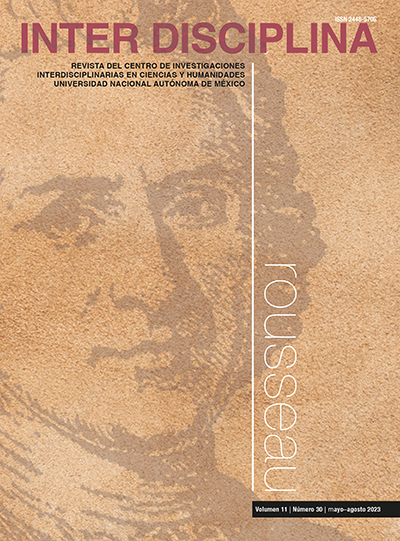Julia or the governor. The foundational discourse of the feminine Julia or the governor. The foundational discourse of the feminine
Main Article Content
Abstract
The purpose of this article is to analyze the foundational discourse of the feminine in Jean-Jacques Rousseau’s epistolary novel Julia, or the new Eloise (1761), based on the representation of women as “governesses”. First, I will present general aspects of the foundational discourse of the feminine in Rousseau’s work; subsequently, I will address the characteristics of the genre of the epistolary novel and the didactic purpose of Julia, to reflect on the importance of moral education and the binary and complementary opposition be- tween man and woman. Finally, I will analyze the foundational discourse of the feminine around the normative figures of the woman as friend, wife and mother, responsible for the ambivalent configuration of the “governess”.
Downloads
Article Details
Citas en Dimensions Service
References
Amorós, Celia. 1991. Hacia una crítica de la razón patriarcal. Barcelona: Antrophos.
Anderson, Benedict. 2007. Comunidades imaginadas. Reflexiones sobre el origen y la difusión de nacionalismo. México: Fondo de Cultura Económica.
Caldo, Paula. 2007. Sofía y Julia. Notas sobre los orígenes de la construcción de la mujer doméstica moderna a partir de una lectura interpretativa de la obra de ficción de Juan Jacobo Rousseau. En XI Jornadas Interescuelas/Departamentos de Historia. Departamento de Historia. Facultad de Filosofía y Letras. Universidad de Tucumán, San Miguel de Tucumán, Argentina.
Granillo Vázquez, Lilia. 2014. Prensa literaria de lo femenino y proto-feminista en México: fuentes de su estado en el siglo XIX. Fuentes humanísticas, 48: 29-47.
Hunt, Lynn. 2009. Torrentes de emoción. Leer novelas e imaginar la igualdad. En La invención de los derechos humanos. Barcelona: Tusquets, 35-70.
Kerber, Linda. 1976. The republican mother: woman and the enlightenment-An American perspective. American Quarterly, 28: 187-205.
Millet, Kate. 2000. Sexual politics. Champaign: University of Illinois Press.
Montero Sánchez, Susana A. 2003. ¿Sofía o Bárbara? El pensamiento social de Rousseau en torno al sujeto femenino. Convergencias. Revista de Ciencias Sociales, 32: 1405-1435.
Rousseau, Jean-Jacques. 2007. Julia, o la nueva Eloísa. Madrid: Akal.
Rousseau, Jean-Jacques. 2011. Del contrato social o principios del derecho político. Córdoba: Universidad Nacional de Córdoba.
Spang, Kurt. 2000. La novela epistolar. Un intento de definición genérica. Rilce. 16: 639-635.
Schmidt-Welle, Friedhelm. 2003. Introducción: Ficciones y silencios fundacionales. En Friedhelm Schmidt-Welle (ed.), Ficciones y silencios fundacionales: literaturas y culturas poscoloniales en América Latina (siglo XIX). Madrid: Iberoamericana/Vervuert, 9-23.
Schoene, Adam. 2019. Silence and the passions in Rousseau’s Julie”. Studies in Eighteenth-Century Culture, 48: 209-226.
Scott, Joan W. 2017. Parité! La igualdad de género y la crisis de universalismo francés. México: Fondo de Cultura Económica.
Theobald, Catherine J. Lewis. 2011. Graphic descriptions: picture and pleasure in Julie, ou la nouvelle Héloise. En Christina Ionescu y Renata Schellenberg (eds.), Book illustration in the long eighteenth century: reconfiguring the visual periphery of the text. Cambridge: Cambridge Scholars Publisher, 367-397.

Esta obra está bajo una Licencia Creative Commons Atribución-NoComercial-SinDerivar 4.0 Internacional.





